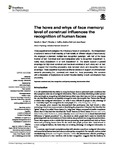The hows and whys of face memory: level of construal influences the recognition of human faces
| dc.contributor.author | Wyer, NA | |
| dc.contributor.author | Hollins, TJ | |
| dc.contributor.author | Pahl, S | |
| dc.contributor.author | Roper, J | |
| dc.date.accessioned | 2015-12-09T14:31:51Z | |
| dc.date.available | 2015-12-09T14:31:51Z | |
| dc.date.issued | 2015 | |
| dc.identifier.issn | 1664-1078 | |
| dc.identifier.issn | 1664-1078 | |
| dc.identifier.other | ARTN 1524 | |
| dc.identifier.uri | http://hdl.handle.net/10026.1/3891 | |
| dc.description.abstract |
Three experiments investigated the influence of level of construal (i.e., the interpretation of actions in terms of their meaning or their details) on different stages of face memory. We employed a standard multiple-face recognition paradigm, with half of the faces inverted at test. Construal level was manipulated prior to recognition (Experiment 1), during study (Experiment 2) or both (Experiment 3). The results support a general advantage for high-level construal over low-level construal at both study and at test, and suggest that matching processing style between study and recognition has no advantage. These experiments provide additional evidence in support of a link between semantic processing (i.e., construal) and visual (i.e., face) processing. We conclude with a discussion of implications for current theories relating to both construal and face processing. | |
| dc.format.extent | 1524- | |
| dc.format.medium | Electronic-eCollection | |
| dc.language | eng | |
| dc.language.iso | eng | |
| dc.publisher | Frontiers Media SA | |
| dc.subject | construal level | |
| dc.subject | face recognition | |
| dc.subject | configural processing | |
| dc.subject | face inversion effect | |
| dc.title | The hows and whys of face memory: level of construal influences the recognition of human faces | |
| dc.type | journal-article | |
| dc.type | Article | |
| plymouth.author-url | https://www.ncbi.nlm.nih.gov/pubmed/26500586 | |
| plymouth.issue | OCT | |
| plymouth.volume | 6 | |
| plymouth.publication-status | Published online | |
| plymouth.journal | Frontiers in Psychology | |
| dc.identifier.doi | 10.3389/fpsyg.2015.01524 | |
| plymouth.organisational-group | /Plymouth | |
| plymouth.organisational-group | /Plymouth/Faculty of Health | |
| plymouth.organisational-group | /Plymouth/REF 2021 Researchers by UoA | |
| plymouth.organisational-group | /Plymouth/REF 2021 Researchers by UoA/UoA04 Psychology, Psychiatry and Neuroscience | |
| plymouth.organisational-group | /Plymouth/REF 2021 Researchers by UoA/UoA04 Psychology, Psychiatry and Neuroscience/UoA04 Psychology, Psychiatry and Neuroscience MANUAL | |
| plymouth.organisational-group | /Plymouth/Research Groups | |
| plymouth.organisational-group | /Plymouth/Research Groups/Centre for Brain, Cognition and Behaviour (CBCB) | |
| plymouth.organisational-group | /Plymouth/Research Groups/Centre for Brain, Cognition and Behaviour (CBCB)/Behaviour | |
| plymouth.organisational-group | /Plymouth/Research Groups/Centre for Brain, Cognition and Behaviour (CBCB)/Cognition | |
| plymouth.organisational-group | /Plymouth/Research Groups/Institute of Health and Community | |
| plymouth.organisational-group | /Plymouth/Users by role | |
| dc.publisher.place | Switzerland | |
| dcterms.dateAccepted | 2015-09-22 | |
| dc.identifier.eissn | 1664-1078 | |
| dc.rights.embargoperiod | Not known | |
| rioxxterms.funder | Economic and Social Research Council | |
| rioxxterms.identifier.project | Construal, Processing Style, and Memory for Social Events | |
| rioxxterms.versionofrecord | 10.3389/fpsyg.2015.01524 | |
| rioxxterms.licenseref.uri | http://www.rioxx.net/licenses/all-rights-reserved | |
| rioxxterms.licenseref.startdate | 2015 | |
| rioxxterms.type | Journal Article/Review | |
| plymouth.funder | Construal, Processing Style, and Memory for Social Events::Economic and Social Research Council |


